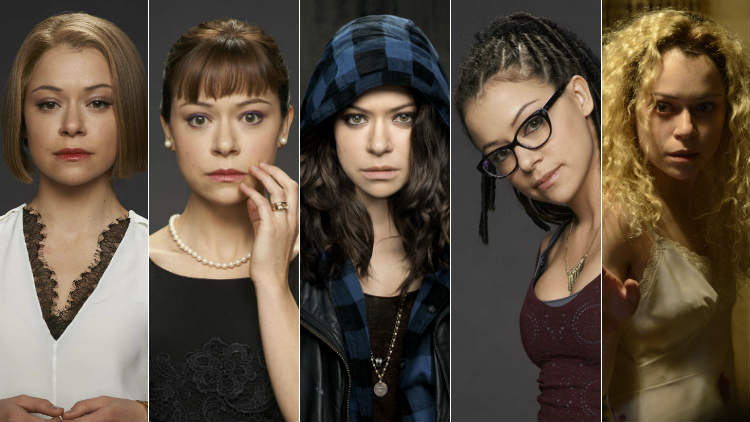Television Review: Orphan Black (Season 1 & 2)
 Orphan Black starts with a contrivance that is never fully explained. A woman happens to see someone who looks exactly like herself step in front of a train. The identical part is – of course – the main mystery, but this doesn’t take too much imagination to figure out. That our leading lady happens to be there to witness it, is the sort of coincidink that you’ll be encountering frequently in this series.
Orphan Black starts with a contrivance that is never fully explained. A woman happens to see someone who looks exactly like herself step in front of a train. The identical part is – of course – the main mystery, but this doesn’t take too much imagination to figure out. That our leading lady happens to be there to witness it, is the sort of coincidink that you’ll be encountering frequently in this series.
Orphan Black thrives on shifting allegiances, mysteries and shocking revelations. It works best at the start, when there is plenty to reveal, even though there is a bit of unnecessary coyness about the reason behind the look-alikes. When the main players have been exposed, some of the urgency is lost. The series keeps adding new twists of course, but risks getting silly because of it.
 The big attraction here is Tatiana Maslany who plays a multitude of characters and manages to make them feel distinct and different. Whether she is playing an uptight soccer mom, a computer nerd or a psycho, she makes you care for them and frequently forget that there is just one actor at the core of all the performances. When the story calls for Maslany to play one of her alternates posing as another, you can still see both characters at play in an impressively layered performance.
The big attraction here is Tatiana Maslany who plays a multitude of characters and manages to make them feel distinct and different. Whether she is playing an uptight soccer mom, a computer nerd or a psycho, she makes you care for them and frequently forget that there is just one actor at the core of all the performances. When the story calls for Maslany to play one of her alternates posing as another, you can still see both characters at play in an impressively layered performance.
 Maslany’s soccer mom incarnation adds an unexpected touch of Desperate Housewives to the proceedings, serving up dark comedy that would have easily fit there. Especially when teaming up with the camp but sympathetic Felix (Jordan Gavaris) the duo lights up the series, even though their scenes together aren’t always crucial to the main story. Some may see Felix as a gay stereotype, but not all the LGBTQ characters in mainstream series should need to be representative of LGBTQ’s as a whole and be as safe and inoffensive as possible. Felix is an escort who is very much in touch with his feminine side and that’s just fine. There is more LGBTQ representation in the series – there are two lesbian characters and later on, a transgender character appears.
Maslany’s soccer mom incarnation adds an unexpected touch of Desperate Housewives to the proceedings, serving up dark comedy that would have easily fit there. Especially when teaming up with the camp but sympathetic Felix (Jordan Gavaris) the duo lights up the series, even though their scenes together aren’t always crucial to the main story. Some may see Felix as a gay stereotype, but not all the LGBTQ characters in mainstream series should need to be representative of LGBTQ’s as a whole and be as safe and inoffensive as possible. Felix is an escort who is very much in touch with his feminine side and that’s just fine. There is more LGBTQ representation in the series – there are two lesbian characters and later on, a transgender character appears.
The second season ended with a major twist that promises to set the series spinning off into a new direction again. The main question will be whether the writers can maintain and expand their web of intrigue without retreading old ground or it feeling forced. But with Maslany very capably at the core of it all, it will take a lot to ruin the compelling central concept.

